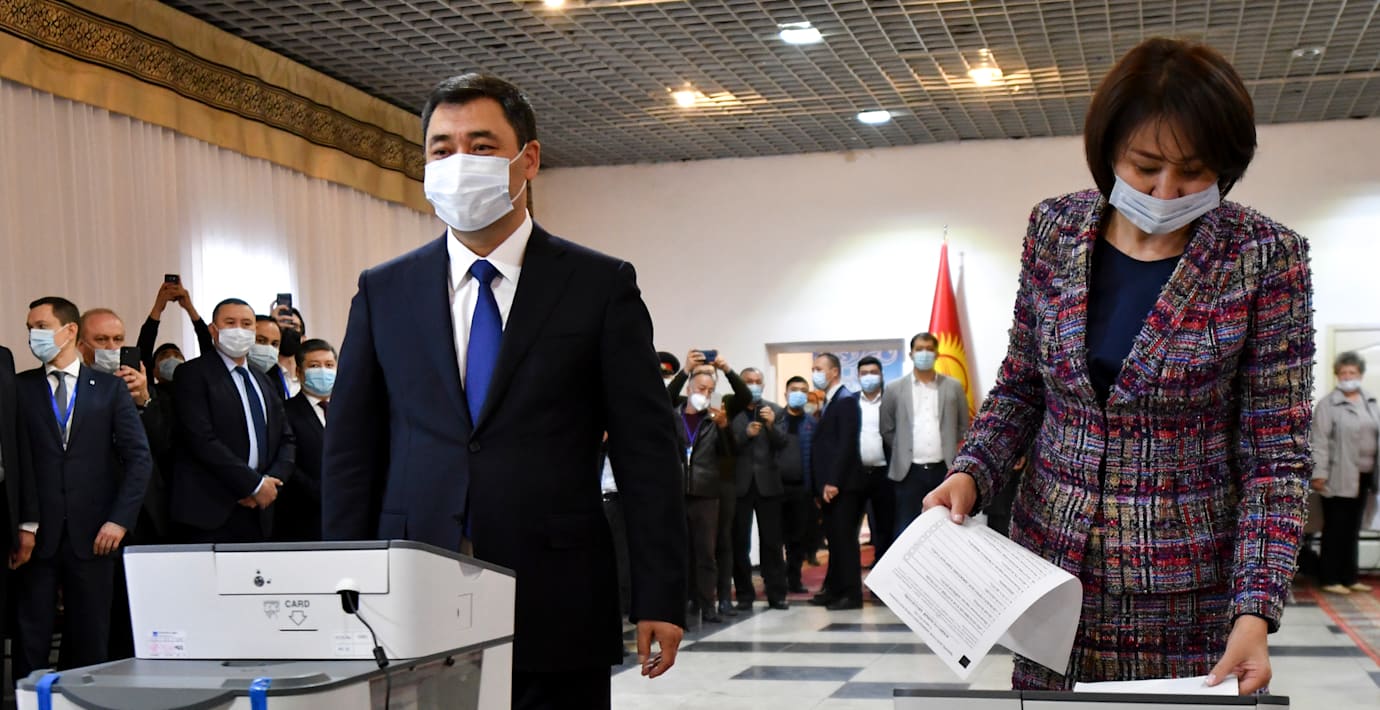
Kirgizistans president Sadyr Japarov får mer makt
Kirgizerna har med stor majoritet röstat för en grundlagsändring som ger presidenten Sadyr Japarov mer makt och möjlighet att styra Kirgizistan längre, rapporterar AFP.
Japorov beskrivs som en populist, men har ett starkt stöd och tog hem en jordskredsseger i presidentvalet tidigare i januari. Rysslands president Vladimir Putin har också uttryckt sitt stöd till en grundlagsändring i det fattiga asiatiska landet och tidigare Sovjetrepubliken.
Anara Nasyrova, 61 år, är dock en av dem som röstade nej under söndagens folkomröstning. Hon litar inte på presidenten.
– Vad händer med hans utlovade arbete mot korruption? Vi ser samma gamla vanliga. Han har inte hjärna nog till reformer, säger hon.
bakgrund
Kirgizistan
Wikipedia (en)
Kyrgyzstan, officially the Kyrgyz Republic, also known as Kirghizia (in Russian), is a landlocked country in Central Asia. It is bordered by Kazakhstan, Uzbekistan, Tajikistan, and China. Its capital and largest city is Bishkek.
Kyrgyzstan's history spans a variety of cultures and empires. Although geographically isolated by its highly mountainous terrain, Kyrgyzstan has been at the crossroads of several great civilizations as part of the Silk Road and other commercial routes. Inhabited by a succession of tribes and clans, Kyrgyzstan has periodically fallen under larger domination. Between periods of self-government it was ruled by Göktürks, the Uyghur Empire and the Khitan people, before being conquered by the Mongols in the 13th century; it regained independence but was invaded by Kalmyks, Manchus and Uzbeks. In 1876, it became part of the Russian Empire, remaining in the USSR as the Kirghiz Soviet Socialist Republic after the Russian Revolution. Following Mikhail Gorbachev's democratic reforms in the USSR, in 1990 pro-independence candidate Askar Akayev was elected president. On 31 August 1991, Kyrgyzstan declared independence from Moscow and a democratic government was established. Kyrgyzstan attained sovereignty as a nation state after the breakup of the Soviet Union in 1991.
Since independence, Kyrgyzstan has officially been a unitary parliamentary republic, although it continues to endure ethnic conflicts, revolts, economic troubles, transitional governments and political conflict.Ethnic Kyrgyz make up the majority of the country's six million people, followed by significant minorities of Uzbeks and Russians. Kyrgyz is closely related to other Turkic languages, although Russian remains spoken and is an official language, a legacy of a century of Russification. 90% of the population are Muslims with the majority being Sunni. In addition to its Turkic origins, Kyrgyz culture bears elements of Iranic, Mongolian and Russian influence.
Kyrgyzstan is a member of the Commonwealth of Independent States, the Eurasian Economic Union, the Collective Security Treaty Organization, the Shanghai Cooperation Organisation, the Organisation of Islamic Cooperation, the Turkic Council, the Türksoy community and the United Nations. It is a developing country ranked 120th in the Human Development Index, and the second poorest country in Central Asia. The country's transition economy is heavily dependent on oil and natural gas along with deposits of gold, coal and uranium.
Kirgizistan
Omni är politiskt obundna och oberoende. Vi strävar efter att ge fler perspektiv på nyheterna. Har du frågor eller synpunkter kring vår rapportering? Kontakta redaktionen